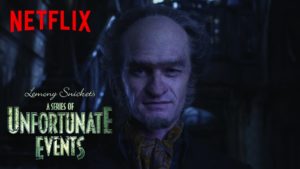
Neil Patrick Harris stars as Count Olaf in Netflix’s adaptation of the beloved series of novels. The first eight episodes cover the events of the first four novels, ending with “The Miserable Mill.”
By Nicole Prieto | Staff Writer
On a dreary Friday the 13th, Netflix premiered all eight episodes of the highly anticipated first season of “A Series of Unfortunate Events.” The show is the second adaptation of Daniel Handler’s books, written under the penname of fictional narrator Lemony Snicket.
After taking a trip to Briny Beach to skip rocks and enjoy the lack of congested tourism, the Baudelaire children, Violet (Malina Weissman), Klaus (Louis Hynes) and Sunny (Presley Smith), receive terrible news: Their parents have just perished in a fire engulfing their home, leaving the children with a sizeable fortune once Violet, the eldest of the three, comes of age. Banker Arthur Poe (K. Todd Freeman) coughs his way into leaving the children with a string of legal guardians of questionable responsibility — from the evil Count Olaf (Neil Patrick Harris) to the skittish Aunt Josephine (Alfre Woodard). The Baudelaires use their inventiveness, research abilities and biting prowess to outwit Olaf and his minions, while working through the mystery behind their parents’ secret lives.
If you have not binge-watched all eight episodes on Netflix, consider this your final warning, because here is the good, the OK and the ugly of Season 1 of ASOUE.
The Good
Thankfully, there is a lot of good to say about ASOUE. Old fans will not be disappointed by the dismal atmosphere of the streamed episodes. Overcast skies, anachronistic fashion and infuriatingly obtuse adults are all present and accounted for.
The adaptation is incredibly faithful to the in-book dialogue and narration — so much so, it is sometimes difficult to notice where it deviates from its written counterpart. ASOUE makes a number of cute attempts at deviating from the books while leaning against the fourth wall. While disguised as Stephano, Olaf mentions his appreciation for watching “long-form television” from the comfort of his own home (while uncomfortably staring into the camera), and Sunny at one point suggests ordering an Uber.
Harris takes on the challenge of living up to Jim Carrey’s 2004 rendition of Count Olaf with gusto. Once you get past his blatantly artificial receded hairline, he gives his own flair to Olaf’s propensity for voice changes and disguises. From the persona of the naïve Stephano in the “The Reptile Room” to the sea-shanty prone Captain Sham in “The Wide Window,” Harris accomplishes what Olaf himself could never do: be a good actor.
On that note, the acting across the board is nothing short of impressive. The Baudelaire children are sympathetic and clearly age-appropriate for their roles. Mr. Poe’s frustrating obliviousness and allergic reaction to common sense are exacerbated by Freeman’s optimistic performance. Joan Cusack takes on the white wig and black robes of the well-meaning Justice Strauss, channeling a successful cross between her straight-laced performance from “School of Rock” with Strauss’ maternal affection for the Baudelaires.
Aside from Harris, the most standout performance is Patrick Warburton’s deadpan take on Lemony Snicket. The iconic actor/voice actor is the best man for the job of inexhaustibly relaying the episodes’ events as they unfold. Snicket’s appearances in the middle of scenes are fluid and appropriately disrupt the main narrative, allowing him to immerse the audience in dramatic irony with everything from offhand comments about character deaths to context-building weather reports.
The OK
The downside of staying faithful to Handler’s writing is how long it makes each episode feel. Each book is split into two-part episodes that are nearly an hour long each. Watching Part II of “The Reptile Room,” for instance, is a test of patience only made interesting by a few unexpected appearances and story embellishments. As fun as it is to see the books come alive, tight editing is a must for an on-screen adaptation, and ASOUE could use more of it.
A related consequence of the episodes’ adherence to their source material is the speed at which everyone seems to speak. I often found myself catching my breath after watching Violet or Klaus explain their inventions or research. The series seems to have trapped itself in a no-win situation: The unnaturalness of the dialogue is exacerbated by the mach speed at which everyone talks. But if everyone was not speaking this quickly, scenes would drag on forever.
On that note, it is likely impossible not to run into the “uncanny valley” when handling infant Sunny’s on-screen antics. Reading about her impossible proclivities in the books is one thing, and seeing them in live-action is another. From playing poker to debarking a tree, prodigal Sunny is not your usual infant. Her intonated babbling is handled well by voice actress Tara Strong, and it is usually not noticeable when actors are interacting with a prosthetic version of Presley Smith in lieu of the small star herself. The use of CGI, however, is obvious and kind of creepy.
The Ugly
The audio is perhaps the most jarring aspect of the series overall. While the score within the episodes is not bad or distracting, each episode’s openings feature singing… by Count Olaf. The theme opens with the lyrics “look away, look away,” playing on how Snicket often warns readers to put down his books and escape their dreadful contents.
Unfortunately, the opening fails to convey that dark humor all that well. The lyrics are hardly catchy, but sitting through them eight times will certainly get them stuck in your head. Frankly, the series could do without the jarring theme song and may be better served by an instrumental title sequence a la “Game of Thrones.”
Lastly, without spoiling too much, expect an inordinate amount of singing to round out the season in what is perhaps one of the strangest production decisions in recent memory.
The End
With the miserable Lucky Smells Lumbermill behind them, the Baudelaires are taken by Mr. Poe to a rather austere institution of learning: Prufrock Preparatory School. With little to their name and one half of a strange spyglass in their possession, the siblings face an uncertain future — knowing that Count Olaf is not far away.
ASOUE’s first season may not be perfect, but it is undeniably a strong, enjoyable start. Fans should definitely anticipate what is projected to be a 10-episode second season.



